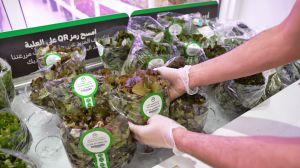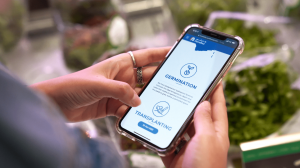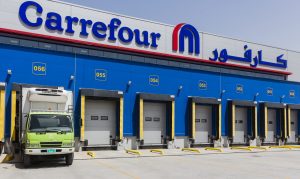Majid Al Futtaim originally franchised Carrefour, one of the leading grocery brands in the area, in 1995. The company currently holds the right to run the brand in over 30 nations in the Middle East, Africa, and Asia – today, with more than 400 Carrefour shops in 16 countries, serving around 750,000 consumers each day.
Jean Luc Graziato, Chief Commercial Officer, Majid Al Futtaim Retail, in conversation with Vibha Mehta, Editor of Logistics News ME, brings forward all the details you would like to read about the day-to-day logistical operations…
- What special measures were implemented in the supply chain for Majid Al Futtaim Retail in 2022 to cope with the post-pandemic situation?
Food security has been one of the most critical aspects of grocery retail since the pandemic’s arrival, not only in the UAE but globally. As the logistics and supply chain challenges we face continue to evolve, we must double down on our commitment to cost control in order to keep rising prices from being passed on to our customers.
Pre-pandemic, grocery retailers could rely on suppliers to fulfil orders accurately and quickly. However, securing goods, especially fresh produce, became a challenge during the pandemic, the legacy of which continues to present obstacles today. Planning during the pandemic became a real challenge and a critical supply chain concern for regional retailers.

We navigated this challenge by sourcing for multiple countries, mainly within the GCC, in our negotiations and direct farm sourcing from one country’s operations to another. We stocked up on non-perishable and long-life products where possible, allowing our team to anticipate and mitigate critical inflation-related business pressures.
We also took other proactive measures by consolidating our purchases in some categories to take advantage of our reach. For example, our size enabled us to buy on behalf of all our markets – negotiating with suppliers to ensure a mutually beneficial outcome and eventually providing better prices to our customers.
While sourcing from local suppliers still needs to become more competitive for mass market distribution, our strategy is to help local suppliers grow their businesses and supply major retailers in every market where we operate. In doing so, we forecast that we can double the volume ordered from local suppliers, generating new opportunities locally and leading to a 5% to 7% savings in total.
As we emerge from the pandemic, we are committed to finding ways to improve as well as test new solutions to maintain robust supply chains and offer unparalleled value for Majid Al Futtaim customers.
- How do you plan to apply automation and AI in the logistics and supply chain?
AI and automation play a pivotal role in the digital transformation of supply chains. A report by Precedence Research suggests that global AI in the retail market is projected to surpass USD 45 billion by 2032.
At Majid Al Futtaim, we are fully aware of this potential and the level of transformation that technology will bring to retail and the broader economy. With that in mind, we have made significant progress in our digital transformation journey since we first embraced it five years ago.

For example, we collaborated with US-based e-Grocery innovator Takeoff Technologies to bring the latest robotised picking technology to Carrefour, allowing up to 2,000 items to be picked per hour per automated fulfilment centre. This digitised storage picking technology automates managing orders, significantly reducing the processing time by up to 50%.
- Please elaborate on the regional breakdown for Majid Al Futtaim Retail’s logistical operations.
Majid Al Futtaim Retail serves over 750,000 customers daily across its 16 markets and, as a result, has strength in predicting and meeting customer demands. We work closely with local suppliers in each of our operating markets, and we are proud that more than 80% of our products are sourced from the region to support local producers, suppliers, families, and economies.
We are utilising different skill sets and technological innovations to continue leading the digital transformation curve in grocery retail, including introducing more fulfilment centres in response to the growing demand following COVID-19. For example, Carrefour KSA recorded a 285% increase in online sales in 2020, and we reacted quickly to address this demand by opening multiple fulfilment centres across the Kingdom. We remain committed to expanding our logistical capabilities to meet evolving customer needs.
- Do events like the Russia-Ukraine war have adverse effects on the operations? If so, how do you cope with these time-sensitive events?
As the conflict in Ukraine approaches one full year, it continues to impact supply chain operations globally significantly. It has caused ongoing disruptions in the flow of goods and services in this region, resulting in higher costs, delays, and supply shortages. The conflict has also caused uncertainty in the market, making it difficult to make long-term plans.
The ongoing situation in Ukraine reinforces the imperative for organisations to develop more resilient supply chain operations. Of the most critical vulnerabilities witnessed today is an overreliance on commodities from a single market or region. Majid Al Futtaim navigates this by sourcing more than 80% of its products from the MENA region.
This commitment to sourcing locally also supports producers and suppliers, families and economies in our locations. We will continue this approach by sourcing first from the best producers and trusted companies in our local markets before looking further afield to the region and international suppliers.
- Would adopting blockchain aid you in achieving a seamless logistics process in your line of work?
Blockchain can enable us to enhance supply chains through faster and more cost-effective product delivery, improving product traceability, boosting partner coordination, and facilitating access to funding.
At Majid Al Futtaim Retail, we introduced IBM Food Trust, a blockchain-enabled global ecosystem for the food industry run on IB

M Cloud. This initiative made Carrefour the first retailer in the region to offer better insight and transparency to our customers about the origin of their food via end-to-end visibility on products throughout the supply chain from farm to shelf.
This in turn, promoted increased quality, credibility and safety for shoppers. The complete history of the production process, the current location of participating food items, and accompanying information, such as certifications, test data and temperature data, are readily available once uploaded onto the blockchain.
- What growth opportunities are you planning to be tapping into in 2023?
Retail is constantly evolving, and – as a forward-thinking and agile brand – we are excited to pioneer new concepts and services that anticipate the needs of our local communities.
In 2023, we remain committed to providing our customers with the best value for money, including the best price, quality, and omnichannel experience. Our data shows that customers are increasingly shifting toward buying goods on promotion. For example, in Oman and Kenya, we nearly doubled promotional sales – and in Pakistan, there is already high promotion penetration at 44%. Leveraging these insights, we are well-positioned to take significant steps to ensure consumers can access all the products they require.

